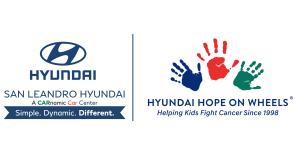San Leandro Hyundai Supports Hyundai’s Hope on Wheels by Donating $30,000 to UCSF Benioff Children’s Hospital Oakland
San Leandro Hyundai donates to support pediatric cancer programs.
“We believe in giving back and the partnership with Hyundai's Hope on Wheels is one close to our hearts. Supporting children battling cancer is not just a cause, it’s a commitment,” said Ayman Moussa, chief executive officer, San Leandro Hyundai. “Doing good is more than just the right thing. It’s a privilege. The ability to help someone, to make a difference, or to ease a burden is a blessing in itself.”
UCSF Benioff Oakland is dedicated to advancing children's health through clinical innovation, scientific advances, and a commitment to health equity. It counts on the generous philanthropic spirit of the community to help sustain its leadership in pediatric health care.
“We are extremely grateful to Hyundai Hope on Wheels for their tireless efforts to support children and families affected by pediatric cancer,” says Stacy Neiman, executive director of corporate and foundation relations at UCSF Benioff Children’s Hospitals Foundation. “Their continued investment is helping us lead the fight against this disease, from breakthrough research discoveries to patient-centered care.”
“San Leandro Hyundai has pledged $250 for every new Hyundai sold during the month of May to support Hope on Wheels. They will present the total amount of $30,000 as a donation to UCSF Benioff Oakland for pediatric care, cancer support, and essential funding for their most critical needs.
“This hospital helps children and their families during their most trying time and brings some joy and relief while making them a little more comfortable, especially when they need it most,” said Chadi Moussa, chief operating officer, San Leandro Hyundai. “We thank the entire team at UCSF Benioff Children’s Hospital Oakland for everything they do for the children and families in our community.”
About UCSF Benioff Children’s Hospitals
UCSF Benioff Children’s Hospitals are among the nation’s leading pediatric specialty hospitals, according to U.S. News & World Report 2024-25 rankings. Their expertise covers virtually all pediatric conditions, including cancer, heart disease, neurological disorders, pulmonology, diabetes and endocrinology, as well as the care of critically ill newborns. The two campuses in San Francisco and Oakland are known for basic and clinical research, and for translating research into interventions for treating and preventing pediatric disease. They are part of UCSF Health, whose adult hospital ranks among the top medical centers nationwide and serves as the teaching hospital for the University of California, San Francisco, a national leader in biomedical research and graduate-level health/sciences education. Visit www.ucsfhealth.org.
About Hyundai Hope on Wheels
Hyundai Hope on Wheels® is a 501(c)(3) nonprofit organization that is committed to finding a cure for childhood cancer. Launched in 1998, Hyundai Hope on Wheels provides grants to eligible institutions nationwide that are pursuing critical research aimed at improving treatments and saving lives. Hyundai Hope on Wheels is one of the largest nonprofit funders of pediatric cancer research in the country. Primary funding for Hyundai Hope on Wheels comes from Hyundai Motor America and its more than 830 U.S. dealers. In 2024, Hyundai Hope on Wheels will surpass a lifetime total donation of $250 million in support of more than 1,300 childhood cancer research grants to over 175 hospitals and research institutions.
About San Leandro Hyundai
San Leandro Hyundai is proud to be a Carnamic Car Center. Located in San Leandro, CA, San Leandro Hyundai will soon relocate to a new state-of-the-art facility in Oakland, CA. Offering new and pre-owned vehicles for sale and service maintenance, the dealership is part of Carnamic, which includes numerous dealerships throughout the San Francisco Bay Area representing Hyundai, Kia, Nissan, INFINITI, and Mitsubishi brands. For more information, visit www.sanleandrohyundai.com or www.carnamic.com.
Ayman Moussa
Carnamic
+1 510-999-5999
email us here
Visit us on social media:
LinkedIn
Instagram
Facebook
Legal Disclaimer:
EIN Presswire provides this news content "as is" without warranty of any kind. We do not accept any responsibility or liability for the accuracy, content, images, videos, licenses, completeness, legality, or reliability of the information contained in this article. If you have any complaints or copyright issues related to this article, kindly contact the author above.
Business Coach Keissy Rengel Empowers Over 10,000 Women Entrepreneurs Through Digital Marketing and Mentorship Programs
Eneba lanza colección especial para que gamers ayuden a cumplir deseos junto a Make-A-Wish
Swapcard Announces Research on Association & Nonprofit Events Revealing Untapped Monetization and Revenue Opportunities
Kalendarium
Więcej ważnych informacji
 Jedynka Newserii
Jedynka Newserii

 Jedynka Newserii
Jedynka Newserii

Finanse

Europosłowie za wydłużeniem finansowania krajowych planów odbudowy o 1,5 roku. Apelują o większą przejrzystość wydatków
Instrument na rzecz Odbudowy i Zwiększania Odporności (RRF) – uruchomiony po pandemii COVID-19 – wygasa w sierpniu 2026 roku. Europosłowie w przyjętej niedawno rezolucji postulują, by przedłużyć ten termin o 18 miesięcy dla kluczowych projektów bliskich ukończenia. To szczególnie ważne dla Polski, która przez trzy lata – przez spór poprzedniego rządu z Komisją Europejską – miała zablokowany dostęp do środków z Krajowego Planu Odbudowy (KPO). Jednocześnie rezolucja wzywa do większej przejrzystości wydawanych funduszy.
Polityka
Prof. G. Kołodko: Druga prezydentura Trumpa zmienia Amerykę i świat na gorsze. Nie przyczynia się do rozwiązywania fundamentalnych światowych problemów

Zdaniem byłego wicepremiera i ministra finansów, prof. Grzegorz Kołodki, trumpizm wzmacnia pewne trendy nacjonalizmu, populizmu ekonomicznego i handlowego nie tylko w Ameryce, ale także w innych państwach. W ocenie ekonomisty Trump i trumpizm będą mieli negatywne skutki dla światowych procesów demograficznych, społecznych, kulturowych i ekonomicznych. Prezydentura Trumpa nie skupia się na rozwiązywaniu najważniejszych światowych problemów, takich jak m.in. migracja, zimna wojna, czy też ocieplenie klimatu.
Konsument
Branża opakowań nie traktuje unijnych regulacji jako zagrożenia. Widzi w nich impuls do rozwoju

W UE co roku wytwarza się ponad 2,2 mld t odpadów. Aby ograniczyć ich ilość, promowane jest przechodzenie na bardziej zrównoważony model, czyli gospodarkę o obiegu zamkniętym. W ramach pakietu zmian prawnych ograniczających negatywny wpływ działalności człowieka na środowisko nacisk położony jest w dużej mierze na producentów opakowań. Przedstawiciele branży podkreślają, że nowe regulacje to dla nich nie tylko nowe obowiązki, ale też okazja na zbudowanie przewagi konkurencyjnej.
Partner serwisu
Szkolenia

Akademia Newserii
Akademia Newserii to projekt, w ramach którego najlepsi polscy dziennikarze biznesowi, giełdowi oraz lifestylowi, a także szkoleniowcy z wieloletnim doświadczeniem dzielą się swoją wiedzą nt. pracy z mediami.









.gif)

 |
| |
| |
|